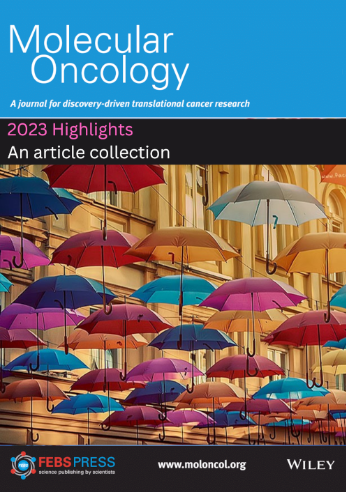Altered splicing of ATG16‐L1 mediates acquired resistance to tyrosine kinase inhibitors of EGFR by blocking autophagy in non‐small cell lung cancer
IF 5
2区 医学
Q1 ONCOLOGY
引用次数: 2
Abstract
Despite the initial efficacy of using tyrosine kinase inhibitors of epidermal growth factor receptors (EGFR‐TKIs) for treating patients with non‐small cell lung cancer (NSCLC), resistance inevitably develops. Recent studies highlight a link between alternative splicing and cancer drug response. Therefore, we aimed to identify deregulated splicing events that play a role in resistance to EGFR‐TKI. By using RNA sequencing, reverse‐transcription PCR (RT‐PCR), and RNA interference, we showed that overexpression of a splice variant of the autophagic gene ATG16‐L1 that retains exon 8 and encodes the β‐isoform of autophagy‐related protein 16‐1 (ATG16‐L1 β) concurs acquired resistance to EGFR‐TKI in NSCLC cells. Using matched biopsies, we found increased levels of ATG16‐L1 β at the time of progression in 3 of 11 NSCLC patients treated with EGFR‐TKI. Mechanistically, gefitinib‐induced autophagy was impaired in resistant cells that accumulated ATG16‐L1 β. Neutralization of ATG16‐L1 β restored autophagy in response to gefitinib, induced apoptosis, and inhibited the growth of in ovo tumor xenografts. Conversely, overexpression of ATG16‐L1 β in parental sensitive cells prevented gefitinib‐induced autophagy and increased cell survival. These results support a role of defective autophagy in acquired resistance to EGFR‐TKIs and identify splicing regulation of ATG16‐L1 as a therapeutic vulnerability that could be explored for improving EGFR‐targeted cancer therapy.ATG16‐L1剪接改变通过阻断非小细胞肺癌的自噬介导对EGFR酪氨酸激酶抑制剂的获得性耐药
尽管使用表皮生长因子受体酪氨酸激酶抑制剂(EGFR - TKIs)治疗非小细胞肺癌(NSCLC)患者具有初步疗效,但不可避免地会出现耐药性。最近的研究强调了选择性剪接和癌症药物反应之间的联系。因此,我们的目标是确定在EGFR - TKI抗性中发挥作用的去调控剪接事件。通过RNA测序、逆转录PCR (RT‐PCR)和RNA干扰,研究人员发现,在NSCLC细胞中,自噬基因ATG16‐L1的剪接变体(保留外显子8并编码自噬相关蛋白16‐1 (ATG16‐L1 β)的β‐异构体)的过表达与对EGFR‐TKI的获得性抗性一致。通过匹配的活组织检查,我们发现在接受EGFR - TKI治疗的11例NSCLC患者中,有3例患者的ATG16‐L1 β水平在进展时升高。机制上,吉非替尼诱导的自噬在积累ATG16‐L1 β的耐药细胞中受损。中和ATG16‐L1 β可以恢复自噬,诱导细胞凋亡,并抑制肿瘤异种移植物的生长。相反,亲代敏感细胞中ATG16‐L1 β的过表达阻止了吉非替尼诱导的自噬并增加了细胞存活率。这些结果支持有缺陷的自噬在对EGFR - TKIs的获得性耐药中的作用,并确定ATG16 - L1的剪接调节是一种治疗易感性,可以用于改善EGFR -靶向癌症治疗。
本文章由计算机程序翻译,如有差异,请以英文原文为准。
求助全文
约1分钟内获得全文
求助全文
来源期刊

Molecular Oncology
医学-肿瘤学
CiteScore
12.60
自引率
1.50%
发文量
203
审稿时长
6-12 weeks
期刊介绍:
Molecular Oncology highlights new discoveries, approaches, and technical developments, in basic, clinical and discovery-driven translational cancer research. It publishes research articles, reviews (by invitation only), and timely science policy articles.
The journal is now fully Open Access with all articles published over the past 10 years freely available.
 求助内容:
求助内容: 应助结果提醒方式:
应助结果提醒方式:


